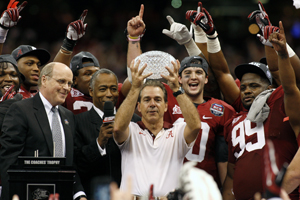As the University of Alabama head coach Nick Saban lifted the crystal, football-shaped Coaches Trophy over his head last weekend, supporters of the Bowl Championship Series across America breathed a sigh of relief. For the first time in several years, the two undisputed, best teams in the country, Alabama and LSU, played for the BCS Championship.
While Alabama’s success may temporarily pacify anti-BCS viewers, the majority of college football players, coaches, analysts, and fans have reached a consensus: Division I college football needs a playoff.
In five of the last eight seasons, a team other than the BCS champion has finished undefeated. These teams fought and played hard throughout the twelve-game season and emerged from these weekly battles without a single loss, yet they were not given the opportunity to be the national champion. Most of these teams come from the mid-major, non-BCS conferences, such as the Mountain West and the Western Athletic Conference, so weak intraconference schedules hurt them, according to BCS officials.
However, football experts throughout these eight years have believed, in fact, the same mid-major teams shut out of the championship game, such as TCU in 2010 and Boise State in 2006 and 2009, have been the best teams in the nation.
The most blatant signal of the brokeness of the system came in 2008, when the Utah Utes finished the season 13-0 after beating the Alabama Crimson Tide soundly in the Sugar Bowl by a score of 31-17. Of course, the Utes played in the New Orleans bowl game because the BCS selection committee did not choose to send them to the championship game.
The icing on the cake for Utah and its fans? That season, the Florida Gators won the BCS championship with a 13-1 record; they entered the game with one loss and played against the one-loss Oklahoma Sooners. Utah, the only undefeated team in America, did not even have a chance to back up its claim as the best team in the country, a brag that its record supported.
Many supporters of the BCS argue that the current system preserves the traditional bowl games of college football, a feature familiar to the more seasoned fans of Glen Davis and Doc Blanchard and the new-generation fans of Tim Tebow and Robert Griffin III. However, a playoff system does not have to eliminate the bowl games or even take away from their importance. For starters, each team that wins six games and qualifies for a bowl game would go to a bowl game. Every mediocre mid-major that claims six victories can still participate in whatever dot-com bowl or Larry’s BBQ game to which it receives an invitation. That part of the bowl series remains the same.
The changes come into effect concerning the top sixteen teams in the nation. These teams would enter into a bracket-formatted playoff similar to the one used by the NCAA basketball tournament. The regular-season champion of each of the six main conferences–ACC, Big East, Big Ten, Big 12, Pac-12, and SEC–would receive an automatic bid. The remaining ten slots would go to the next ten best teams based on rankings in the final AP poll. Of course, this decuplet could all be members of the same conference theoretically, but good teams that did not win their conferences, such as Alabama this year, and notable mid-majors, such as Boise State, would have a fair chance to win a national championship.
Now what about the traditional bowl games? The national championship game and the two semifinal games would be held in a different city each year, following the format of the basketball tournament. These hosts would most likely be a warm-weathered venue with an NFL-sized stadium, such as Tampa, Miami, or Dallas. In addition, the opening round of the playoffs would be held at the home stadium of the higher seed.
However, the four “Elite Eight” games, or the quarterfinals, would take place in the position of the major bowl games, Rose, Fiesta, Sugar, and Orange. For example, one of the quarterfinal games would take place at the Rose Bowl in Pasadena, California, and still be called the Rose Bowl Game. The annual Rose Parade would still precede the game, along with all its other pomp and circumstance. The only difference in this game from previous years’ bowls would be that the winner would advance to the semifinals of the playoffs.
This proposal eliminates the need for the BCS, an unecessary piece of college football. It gives more teams a chance to win a national championship and helps represent the great mid-major programs of the country. Yet it also preserves the traditions that make college football so much fun, appealing to every type of fan. Lastly, it produces a definitive winner that claimed victory through four hard-fought games instead of with the aid of a computer-generated poll. But, no matter how the details of the future of college football shape out, one thing is sure: the Bowl Championship Series has got to go.









